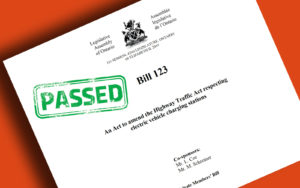Passing of bill is symbol of how political parties can work together to advance EV adoption as Ontario joins Quebec and Vancouver with legislation to deter so-called “ICE-ing” with $125 fine

Province joins Quebec and Vancouver with legislation to deter so-called “ICE-ing” with $125 fine
Ontario’s provincial government has voted to pass Bill 123 which establishes a $125 fine for blocking an electric vehicle charging spot.
The practice of blocking an EV charger is popularly referred to as “ICE-ing,” in reference to the internal combustion engine of non-electric vehicles.
As reported by Electronic Autonomy Canada, the bill was introduced in June by MPP Paul Calandra, before being taken up again in late November by PC MPP Lorne Coe and Ontario Green Party Leader Mike Schreiner.
Two amendments were made to the bill following its second reading. One specifies that the fine will be assigned to the owner of the offending car, rather than to its driver. The second indicates that the bill will only apply in charging spaces in which a sign has expressly prohibited its blocking. Such an amendment protects homeowners from receiving fines for blocking their own chargers; it also allows property owners to protect certain charging spaces but not others as they see fit.
Similar laws prohibiting the blocking of charger spots are in place elsewhere in Canada. Quebec adopted a $100-$200 fine for blocking chargers last spring; cities including Vancouver, Sudbury, and London have passed comparable bylaws. Anti-ICEing legislation has also been passed in 13 U.S. states, including California, Colorado and Florida.
A promising sign?
Such an instance of cross-party collaboration to advance electrification is an encouraging sign for those hoping federal leaders will follow suit. Canada has a history of progressive collaboration under minority governments, and there is much need for legislative action to advance adoption of EVs.
Although the bill received wide support, some members of parliament have criticized its limited reach.
The level of awareness surrounding the need to transition to EVs is encouraging, however, says Wilf Steimle, president of the Electric Vehicle Society, which represents EV owners. “I was impressed to see how well-informed our political leadership was across the parties,” says Steimle, who advocated for the bill.







